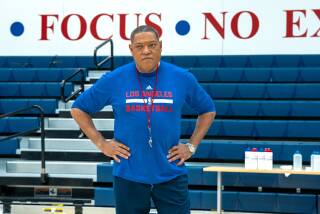Dailey Learning Game of Life Is His to Win--or Lose
- Share via
The popcorn story tells a lot about Quintin Dailey, the newest L.A. Clipper, about where he’s been and where he’s at.
It happened two seasons ago. Quintin was a Chicago Bull, among other serious problems.
The Bulls were playing the Spurs in San Antonio, and Dailey came out of the game, complaining of back spasms. He was through for the night. He sat on the bench. He got hungry. He summoned a ball boy and had the ball boy jog over to press row and borrow $5 from one of the Chicago writers.
Then Quintin had the ball boy jog to a concession stand and buy him some popcorn. Dailey sat on the bench, in the heat of the game, and ate his popcorn.
The story became an instant NBA legend. Within the week, some newspaper accounts had him wolfing down nachos, pizza, hot dogs and soft drinks.
Where Quintin was at then was nowhere. He was floundering. He was angry. He was troubled. He was hungry.
“I was being real stupid,” says Dailey, who doesn’t like to talk about that incident, or many others from his past. “I was rebelling. I felt I wanted to get back at people, and all I did was hurt me, in the long run.”
What about now?
Now Dailey is no longer rebelling. He’s still hungry, but he has discovered this thing called will power. No more snacks, no more junk food. At a recent breakfast interview, he ordered juice, sausage and toast, and didn’t even eat the crusts.
From all outward appearances he is a new man, which is good. The last thing the Clippers needed was the old Quintin, a man with a drug problem, attitude problem, and the munchies. What if Benoit Benjamin learned from Dailey that you could sit on the bench and order out?
When the Clippers salvaged Dailey from the Continental Basketball Assn. three weeks ago, he was 25 pounds overweight and couldn’t shoot. For a 6-3 shooting guard, those are two significant handicaps.
He has lost about 15 pounds since then and rediscovered his touch. He scored 28 against Utah last Saturday, sending the game into overtime with a jump shot and winning it with free throws. He scored 16 at Denver two days later. He’s starting to look like a player.
Not long ago it seemed that Dailey might be washed up at 25. After his two check-ins at drug rehab centers for cocaine abuse, his popcorn eating and various other problems, the Bulls waved goodby midway through last season.
Quintin now knows who to blame.
“No one takes things away from you,” Dailey says. “When I went to the (drug) hospital, I gave it up. I’m the one that got myself out of this league, so I couldn’t blame anyone but me.”
He says he’s done a lot of thinking, a lot of introspection. He’s got another chance in the NBA. His wife is expecting their first baby in two months. He knows what he wants.
“I went through all the success, money, clothes, but I didn’t have any fun,” he says. “Now I’m just gonna be happy. As coach Wooden says, peace of mind--’When you do all you can, the best you can do, that’s peace of mind.’ Now, for the first time in a long time, when I look in a mirror I can say I’m doing everything possible.”
If he’s found that kind of peace of mind, it’s been a long time coming. When Quintin was 13, his father died of cancer and his mother died a month later after a nervous breakdown. In his depression and loneliness, basketball was all he had.
It carried him through high school and college and into the NBA. He was great on the court, but out there in real life there were major problems. At USF he was sued by a female student who claimed Dailey assaulted her in her dorm. The suit was dropped when Dailey agreed to give her a letter of apology and $100,000.
In the NBA, mental depression and cocaine finally brought him to his knees. He’s fighting back. Most NBA guys who get down as far as he did don’t make it back, not for long. Check the record.
He knows everyone is watching. He knows he can’t show up late for games or practices, because that’s what coke users do. On the road, just to be sure, he leaves two wake-up calls, sets an alarm and asks a teammate to come by and knock on the door.
“People do oversleep,” he says, smiling. “I don’t have that luxury.”
Now he’s in a situation in life a lot like the one he found himself in long ago, at a high school basketball practice.
“I got into an argument with the coach and walked out of the gym,” he says. “I thought I was hot (bleep). I stormed out, walked down the steps. Then I looked around, and no one was there. There was nowhere to go but back up the steps.”
More to Read
Go beyond the scoreboard
Get the latest on L.A.'s teams in the daily Sports Report newsletter.
You may occasionally receive promotional content from the Los Angeles Times.






